An Escapologist’s Diary: Part 56. The Future Echo.
A few years ago, I attended a conference just outside Glasgow. It was a waste of time and energy even within the framework of my already-a-waste-of-time job, but attendance was mandatory and that was that. It was precisely the sort of thing that would push me from a state of generalised frustration and into a bleak, chastised, depression-adjacent funk.
As I walked deliberately slowly to the conference centre from the train station, weighed down with a laptop bag of stupid paperwork, I crossed the Forth and Clyde Canal. I looked down from the bridge at the still water, and thought “one day, I’ll walk through this junction again, on my own terms and trouble-free.” I knew that my state of consciousness would be completely different to the one that was currently currently me to grind my teeth. It was such a certainty that I could practically see my future self walking contentedly along the towpath.
I’d forgotten about the future echo until this afternoon when, hiking the twenty-mile journey from Glasgow to Loch Lomond, I crossed beneath the familiar bridge. “Whoa! It came true!”
I looked up at the bridge and imagined my past self and sent the telepathic message back through time that things would be okay.
And then I climbed up onto the bridge and took a photograph for a reminder. This spot can now be called Future Echo junction. (Thankfully I did not also see my bloated corpse floating face-down in the canal.)
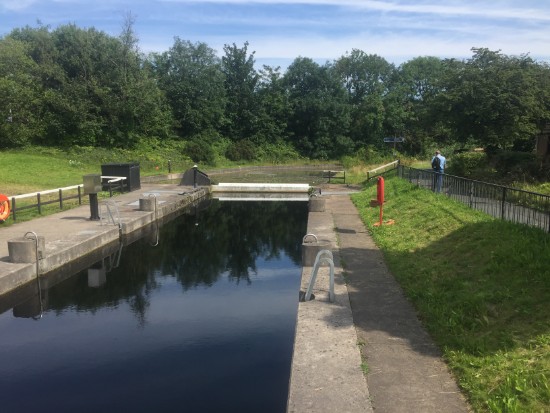
Psst! Please support this enterprise at the New Escapologist Patreon.
An Escapologist’s Diary: Part 55. Operation Breadhead
I’ve been working harder than usual to make money. It’s a year-long project of uncharacteristic money-grubbing. I call it Operation Breadhead and we’re three months in.
I have a big pie-chart, which I look at every day to see how far I am from making the money I need. Cash earned so far displays in the pie as green (my favourite colour) and it advances against the red (my least favourite colour) in a genuine attempt at motivating myself (to replace red with green). Instead of red, I thought about using a picture of Theresa May’s office-manager face, which I could gradually cover with pleasant rain-forest green, but I couldn’t work out how to do that in Google Sheets.
This is all to do with the visa again, I’m afraid, and the associated minimum income requirement. We satisfied it last time through horrible, horrible employment [place werewolf howling sound effect here], but this time we have chosen to resist such catastrophic disruption to our lives and to do it through part-time employment (on my wife’s part) and self-employment (on mine). Tactical!
For my part, this has meant writing, writing, writing. And managing that writing enterprise in a way that I have never bothered about before. Honestly, I even have an accountant now. I’m dabbling with overseas editions and things like that too.
It’s actually been a lot of fun. Being creative and resourceful instead of submitting to a tedious day job is Escapology in a nutshell. And where the project is not “fun” per se, it has at least been instructive and interesting. I’ve had to stretch myself and increase my usual annual income by about 20% but, let’s face it, that’s something I should do anyway.
It’s also rather exciting to know that once it’s done, it’s done forever this time. At the end of this financial year, we’ll have everything we need for “indefinite leave” on the visa front, and my wife and I can be together with minimum threat of being separated or forced to leave my own country.
Anyway, we’re three months into Operation Breadhead and all goes well. In fact, I hit 50% of my target after the first two months, which was a considerable confidence boost and a welcome relief of pressure, but this large chunk relied on shaking some old piggy banks — calling in my book royalties and the likes — rather than creating new work.
I’ve also been running around, writing bits and bobs for magazines, though this has been for comparably small amounts of money and involves an inordinate amount of chasing people up to actually get paid. I don’t know why they’re like this: I doubt they’re so evasive about paying, say, their electric bill, so why give the writers a hard time when they’re arguably an even more important ingredient in conjuring up a magazine? Has there ever been a strike? Surely, we’re essential?
It has proven less difficult to extract money from less-creative writing projects. Copywriting and the likes. This is because the money for such work seems to come from marketing budgets, which are generally taken more seriously. You know, because marketing.
In particular, I’ve been doing some copywriting for English universities whose marketing budgets are clearly through the roof. This is fairly dull, though the people are nice. One fellow for whom I’m writing is a kindly Canadian who grew up two streets over from where my in-laws now live in Montreal. He’s a lovely fellow with a passion for his academic subject, though he rarely seems to remember who I am when I call. This sort of thing always bewilders me: even if you can’t remember my name, why isn’t this pre-arranged phone call in your diary? Why are you expecting the call? Still, at least this sort of scatterbrain nature doesn’t seem to be in service of “forgetting” to pay me.
As a consistent side project that will take far longer than the Breadhead period to complete, I’ve been editing and transcribing sections of a friend’s life-long travel journal. He is kind to pay me for this as I used to read his writing purely for pleasure. The total work is (genuinely) three times longer than War and Peace and its not finished yet. He’s going to be the Samuel Pepys of end-of-the-century travel writing one day. He has, quite simply, been everywhere. Literally everywhere you can think of.
Elsewhere for this omni-caper, I directed a one-person comedy show, helped to design a library (not sure if that qualifies as literary work but it was at least pleasant and studious and was no struggle to get paid), and edited part of a book about ’80s indie music.
Aaaaanyway. I just wanted to let you know what’s happening at the moment in this life on the lam. I’m treating the visa situation as just another escape: escape from a pesky situation using tactics and a little bit of elbow-grease, this time (largely) on my own terms.
I know this all looks rather busy and manic but the fact remains that I really do only put in about four hours a day before kicking back with a book (I’m currently reading the diaries of David Sedaris and a funny old book about “microbes”) or hitting the pub or the cinema.
Don’t worry, gang. The next Escapology-focused book is in the works too. It is written and is in the hands of my agent. More on this when I have it.
*
The point of this here long-running Escapologist’s Diary series, by the way, is to chronicle the life of an Escapologist, to help answer the question of “what would I do if I didn’t have a job?” in almost sarcastic detail. You can now do this in even more granular detail (what joy!) over here. Leave a comment to help me feel less like I’m spaffing away into the abyss.
An Escapologist’s Diary: Part 54. 2018 Review.
Wehey! I have escaped again. How’d you like that, my imaginary shareholders?
Admittedly, this particular escape involved running the clock down on something like a prison sentence more than the commitment to a clever escape plan. But an escape’s an escape and it feels good to be on the lam again, feeling the breeze around the old wosnames.
As some of you know, I put a peg on my nose and took a job when we came back to Scotland from Canada. It was to help my partner secure her visa to live here.
We won that visa in September (using the immense stack of paperwork pictured below) and we immediately set about getting our lives back on course. On my part this means a full-time return to the cheerful, frugal literary life. Much better.

Bagging the visa and escaping office life again were the key events of our 2018, though they do not feel particularly like achievements. It’s just a happy return to the status quo, to what we were doing until someone stopped us.
But hey! there was also the book deal. That was big news. The first half of the advance came in and I started writing. I’ve almost written a whole new book this year. I hope to have finished it by the end of January 2019.
At the start of the year, I set up a mailing list to try and guarantee a readership for my weekly diary. I kept up the diary itself until October (31 entries – medal please) and was rewarded with the highest numbers of visits ever to my website (even if those numbers are admittedly small potatoes). I plan to pick up the diary again in 2019, but not until the book is written, obvs.
There were seven new installments of my Idler column, bringing the total up to 17 (plus extra bits and bobs) and my longest-running gig outside New Escapologist, which hardly counts. I’ve enjoyed getting the occasional email (and Idler letters page response) about the column, none of them (yet) irate.
My stupid face appeared in an art installation (Sven Werner, City Art Centre, Edinburgh) and also in a more domestic setting by my clever wife.
Tim Blanchard’s book about the novelist John Cowper Powys was published in November. I had some small editorial involvement before Tim found a publisher so I was very happy indeed to see the book come out.
For travel, we saw Paris, Malaga, Seville, Gibraltar, and Copenhagen (pictured below in a photograph by AJ).
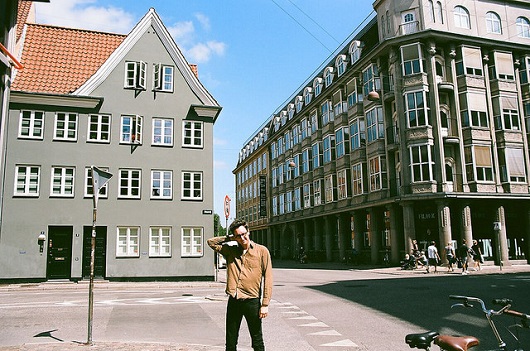
In non-writerly action I spent the occasional Friday at a botanical library near to where I live. Here I have a freelance project to catalogue the collection. I spend these days handling attractive books about trees and flowers and mushrooms and the likes. Why not?
I also had the pleasure of calling the fire brigade, joining Instagram, remembering the spice girls, finding run-up-to-the-visa solace in the best ever Lego set (and reselling it – minimalism!) and taking a reaction test.
*
As traditional, here is my year in books. A change on previous years is that I’ve stopped recording comic books in this list. There’s too many of them and, let’s face it, it’s a completely different aesthetic experience. (If you’re interested, I enjoyed Ms. Marvel this year and the first volume of The Chilling Adventures of Sabrina. I was surprised not to enjoy the new Multiple Man series.)
I made an effort this year to read some new fiction instead of old everything. I also made my usual effort to read more women and non-white writers.
Lest we forget, an asterisk* denotes an out-loud read while the dagger† denotes a re-read. Schwing!
Bill Bryson – Neither Here nor There
Bill Bryson – The Road to Little Dribbling
Daphne du Maurier – Not After Midnight
Alastair Bonnett – Off the Map
Bill Bryson – African Diary
Joe Dunthorne – The Adulterants
George Orwell – Coming Up for Air †
Shoukei Matsumoto – A Monk’s Guide to a Clean House and Mind
George Orwell – Keep the Aspidistra Flying †
Patrick Hamilton – Hangover Square
Muriel Spark – The Prime of Miss Jean Brodie
Sam Selvon – The Lonely Londoners
Donald Westlake – The Hot Rock
Yanis Varoufakis – Talking to my Daughter about the Economy
George Perec – W, or the Memory of Childhood
T. H. White – The Once and Future King
Clive Bell – Old Friends
Darren McGarvey – Poverty Safari
Alex Masters – A Life Discarded: 148 Diaries Found in a Skip
Muriel Spark – The Girls of Slender Means
Helen Russell – The Year of Living Danishly
Caitlin Doughty – From Here to Eternity
Fumio Sasaki – Goodbye Things
George Saunders – Pastoralia
Limmy – That’s Your Lot
Michael Booth – The Almost Nearly Perfect People
Nan Shepherd – The Living Mountain*
Matthew Crawford – The Case for Working With Your Hands
Haruki Murakami – Men Without Women
Matthew De Abaitua – Self and I
Helen Lamb – Three Kinds of Kissing
Kamin Mohammadi – Bella Figura
Tade Thompson – Rosewater
PD James – Sleep No More*
Evelyn Waugh – The Loved One
Jonathan Meades – An Encyclopaedia of Myself
Books read in substantial part but left unfinished:
Richard Sennett – Together: the rituals, pleasures and politics of cooperation
Mary Beard – SPQR
Richard Gordon – Nuts in May
Robert Skidelsky – John Maynard Keynes 1883-1946
I am currently reading After the Snooter by Eddie Campbell (a comic) and Proxies by Brian Blanchfield (essays).
*
I end 2018 happy with my personal lot at the age of 36, though I also feel irritated and under siege for reasons I can’t quite put my finger on. I might have to stop drinking. Or ideally they’ll cancel Brexit.
An Escapologist’s Diary. Part 53a: Escape!
September 3rd 2019: I found this unpublished entry sitting in the drafts file. It dates from October 2018, when paranoia or anxiety must have stopped me from posting it. Or maybe I found it too bitter or too boring to be worth posting. I don’t recall. In the end, I touched on these events more succinctly in An Escapologist’s Diary: Part 54, but looking at it now, it better fills a gap in the story. So here it is after all:
*
As some of you know, I’ve been working a day job to protect my partner’s visa so that we can continue to live together in the same country.
I suppose this serves us right for choosing a life of rootless cosmopolitanism, but when we began our relationship in 2008 or thereabouts, there was no such thing as The Hostile Environment and moving freely between Britain and Canada was relatively straightforward.
In 2012, they changed the rules and the one that hit us in particular is the Financial Requirement; an insistence that we earn a fairly high (for us) amount of money. They complicate it by saying you can’t mix different sources of income, and there are various other administrative uncertainties and poorly-phrased vagaries to punish the unused or the self-employed. This meant that when we came back to Britain in 2015, I would have to take on some sort of employment.
To this day, I have no idea why this Financial Requirement is necessary (aside from simply bullying people into self deportation, which is actually the point of the Hostile Environment). If we must insist on immigrants proving that they won’t over-rely on public assistance, a fairer and more meaningful system would be to ask for proof of adequate maintenance – simply that the couple can support their lifestyle. Striving to earn the seemingly arbitrarily arrived-at financial requirement completely destroyed our way of life. We don’t need such large incomes and we don’t want to sell so much time for it.
Anyway, the point of this is to introduce my diary-worthy news; that our latest visa application was successful and that we’re safe for another 2.5 years. I have also quit my day job. Escape at last.
I can now dedicate my time to writing my next book and generally living in the happy, creative and frugal fashion I enjoyed before the visa crisis and which I have advocated for so long in New Escapologist. Phew!
The Financial Requirement (unless it is thrown in the bin by an incoming Labour Government or pulled down by activists rightly angry about the Windrush scandal) will become relevant to us again in 2021 but we think we’ve found a way to tackle it this time without conventional employment. I should be able to make enough from my writing over the next 2.5 years to complement my wife’s earnings from a part-time job. (For various reasons I’ll not go into, this option was not available to us before.)
All of this comes as a huge relief and now I can get back to being myself. Man alive, it’s been a tough couple of years, but now the fun and joy is back.
An Escapologist’s Diary: Part 53. Copenhagen.

We’ve returned from a few days in Copenhagen, which seems to be a sort of Utopia.
There’s not much need for Escapology there. Work is apparently pleasant and minimal. The State seems to look after people instead of oppress and frustrate them. The culture seems liberal, expansive and geared toward trust, leisure and happiness.
The official working week in Denmark is 37 hours, already one of the shortest in Europe. But calculations from Statistic Denmark suggest that Danes actually work an average of just 34 hours a week. Employees are entitles to five weeks’ paid holiday a year, as well as thirteen days off for public holidays. This means that Danes actually only work an average of 18.5 days a month.
I’m now trying to make sense of what we saw by reading The Year of Living Danishly by Helen Russell. I remember that this book was very popular a couple of years ago. Yes, I’m aware that I’m late to the Hygge party.
Russell’s book is well-researched and entertaining so I’m scattering some choice quotes from it alongside my subjective observations and boring holiday snaps in this here diary entry.
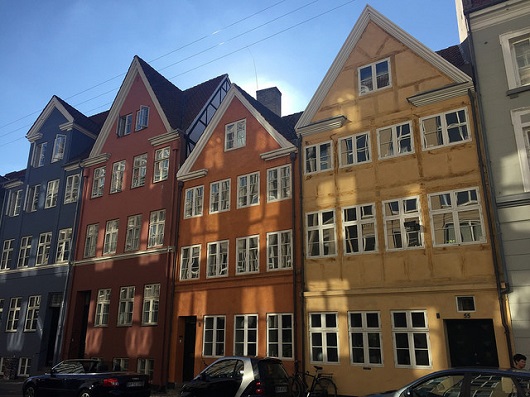
It seems that one of their solutions to the good life is to let the State handle all of the stuff at the bottom of Maslow’s pyramid so that the people can get on with the self-actualising. Most Danes pay something like 37% income tax and a fairly steep VAT (consumption tax). It works. Remember (from New Escapologist Issue 3) that accumulated personal wealth beyond an income of £22,000 per year brings no further happiness, so why not give it up to benefit the whole?
They have an obscenely good quality of life. Yes, it’s expensive here. But it’s Denmark — it’s worth it. I don’t mind paying more for a coffee here because I know that it means that the person serving me doesn’t a) hate me or b) have a crappy life. Everyone is paid a decent wage, everyone is looked after, and everyone pays their taxes
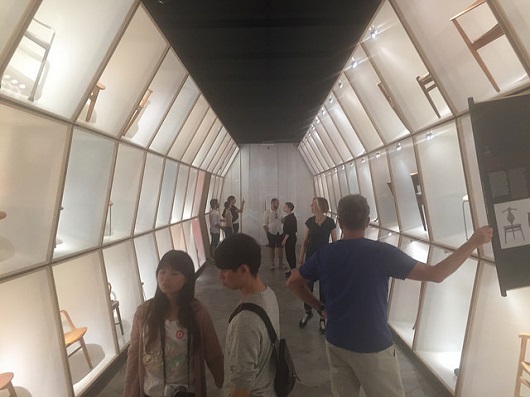
In Copenhagen, everyone seems to ride around on bicycles, looking extremely stylish — often with a carefree cigarette hanging out of one side of the face.
biking is practically a religion here, no matter what your age or your occupation. Denmark is covered with over 7,500 miles of bike paths and Danes will cycle come rain or come hail. The government recently introduced their ‘National Cycling Strategy’ to get even more Danes on their bike. Danes are so bike-obsessed that you can even opt for a tricycle hearse to end the cycle of life. Half of all commuters in Copenhagen go to work by bike and Forbes magazine recently reported that cyclists save the city £20 million a year in avoided air pollution, accidents and congestion.
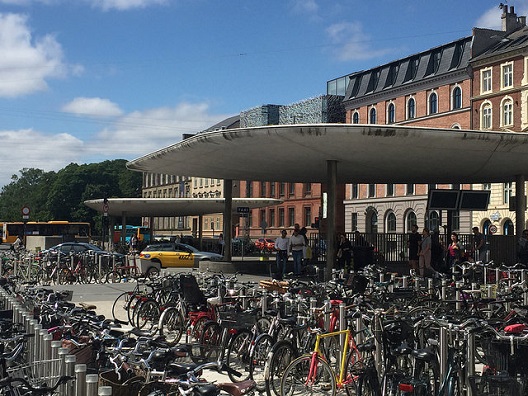
A few friends who had been there already said we’d “get bored of leggy blondes” and while the British eye will boggle at so many flaxen Nordic giraffes, it’s important to mention that Copenhagen doesn’t feel tediously white. I was surprised and delighted by the African and Middle Eastern influences. Headscarves and good food abound.

To be honest, by picking up The Year of Living Danishly, I was looking for downsides because it doesn’t seem very sophisticated to go around thinking that “everything is better in Denmark,” but while a few downsides are mentioned in the book (most of which are to some degree understandable), they’re not exactly the dark energy source I was looking for.
I’d been bracing myself to find a burbling battery of racism powering the nation or that they all worship an underground slug or something. But nope. I think it’s just a good place to live.

Once they’ve had children, 78 per cent of Danish mothers return to work. This is because childcare is subsidized by the government and the famed work-life balance of Danish workplaces makes it easier to balance career and family life here than it would be elsewhere. What has traditionally been defined as ‘women’s work’ is valued as highly as traditionally-defined ‘men’s work’ here — and both sexes do a bit of each.
On the street, the high quality of life is evident. In Darren McGarvey’s book, he describes what it was like to visit the affluent West End of Glasgow for the first time, having come from the rough-and-tough suburb of Pollock. He reports marveling at how violence didn’t seem to hang in the air and people seemed relaxed until he walked by in his tracksuit. Well, I live in the affluent West End of Glasgow and this was my equivalent; I was similarly taken aback by the palpable sense of collective happiness, satisfaction and pride.

We explored the city quite intensively during our limited time and my favourite place to spend time in was probably the Design Museum, which is where I was able to look at the endless loveliness of Danish design. Samara described me as being “in a froth” by the end of it, but I felt like I’d been through some wonderful therapy.
Make your environment as beautiful as you can. Danes do, and it engenders a respect for design, art and their everyday surroundings. Remember the broken window syndrome, where places that look uncared for just get worse? The reverse also applies.

Anyway, that’s enough blowing smoke up Denmark’s bottom. It’s a good place to live. But don’t move there please, as I think the small (5.5m) population is part of the key to their success. Instead, let’s import some of their ideas for living.(There’s a “top ten tips for living Danishly” in the back of the book, which are actually quite similar to New Escapologist‘s own Things of Value).
I thought I was doing all the right things to get to this point in my [London] life — working hard to be succesful and trying to please everyone. But I never seemed to succeed nearly enough to make all the effort worthwhile. I felt tired, hungry (often literally) and ephemeral, blown about by the currents of whatever was going on around me. But now I feel safe, secure and solid.
★That really good photo at the top of this post? I didn’t take that one. That’s the work of AJ.
An Escapologist’s Diary. Part 52: Bank Holiday
It’s an extremely sunny bank holiday here in Scotland.
There was a nice vibe on the street this morning. “Gosh, this is alright,” I thought, “We’ve not done such a bad job of building a world.” Yes, the fine weather had a lot to do with this mood but it wasn’t only that. It was the sense of quiet industry and the leisurely getting about. I felt, unusually, that I could relate to the people I saw. They weren’t rushing everywhere. They were scrubbing steps, cycling, putting out sandwich boards, walking with a light jacket slung over one shoulder, arranging things in windows.
You’d expect a bank holiday morning to be quiet and it was, but it was hardly devoid of activity. The shops — small business and supermarket chains alike — all seemed to be open, their keepers and shelf stackers setting up as usual. Even our local Post Office was open for business, though the actual deliveries I believe have stopped until Tuesday. There were still a few white-collar commuters about (Britain’s largest employer, the NHS, does not close for bank holidays) but a far smaller number of cars than usual. This made a huge difference; it meant fewer decibels, noticeably cleaner air, less hostility and impatience, and opportunities to cross the roads in a leisurely manner instead of waiting for a light to change or for a gap in the traffic. It struck me as a pretty good pace of life and I wished it could always be this way. Things hadn’t ground to a halt but it wasn’t stupidly busy either, no harried faces, no sense of dread.
I mention this to say that a slower pace of life doesn’t mean an end to industry, an end to meaning, an end to money-making or getting from one place to another. It just means balance. It means enough people sleeping ’til 10 and having leisurely breakfasts and enough people keeping the world running. Why, we could take it in shifts! It would mean less pollution and fewer heads exploding with stress and anxiety. Wouldn’t that be good?
The art gallery my wife works for is open. The florist I pass each morning is open, as is the library. The pubs and restaurants soon will be. The universities are open. Public transit is running, albeit to a limited timetable. The Deliveroo fleet will be out and pedalling this evening.
So if all of these useful people are on duty as usual (and various street markets and the likes are opening especially for the bank holiday) why are the streets so quiet? Who exactly is off work and off the roads and in their beds? Could it be the bankers? Well, yes, it’s a bank holiday. But that can’t be so many people. The major international bank I use has only one branch (let’s generously assume 40 employees) and will surely be automated out of existence soon. So who are these people with a day off today and another on Monday?
Oh, it’s the people with bullshit jobs! The ones in jobs which aren’t really needed at all and which, in fact lead to the harried faces and the grief and the fumes and the rat-like scurrying!
The Skypark, I noticed, stands empty today. Ten or so stories of glassy desolation.
A bank holiday morning, dare I say, is a good real-time, 3D visualisation of how the world, perhaps post-UBI, could look without bullshit jobs. Cleaner, calmer, more leisurely and at peace.
An Escapologist’s Diary. Part 51. 2017 Review.
Holy Smokes, is that the time? Ja! It’s the (eighth?) annual report to my imaginary shareholders.
Though the world’s terrifying problems continue, 2017 somehow felt like a nicer year than 2016 didn’t it? Maybe it was the encouraging resistance to evil we witnessed around the globe or perhaps it was the incompetence revealed in the devils themselves. Whatever the reason, I certainly feel happier today than I did at the end of 2016. I hope you feel similarly, dear reader.
This being said, much of my year was spent negotiating the aching bullshit of The Hostile Environment. This meant my partner and me working in day jobs again — she full-time, I part-time — and largely putting our frugal, creative lives on hold. But never mind! Things, to some extent, still happened:
In January I wrote a piece about Death and Minimalism for Caitlin Doughty’s blog. It’s only a little thing but CD (as the cool kids call her) and her blog are so phenomenally popular that I still get email about it a year later.
This loudcast also nudged some nice people into my Patreosphere, a funding system that led me to write and post some six new essays (and re-edit six old ones) this year. There will be another dollop of this in 2018, so please join in and encourage a bit more Escapological writing if you can.
In February, my silly face appeared (below) in an Alan Dimmick forty-year retrospective in Edinburgh. It felt good to be welcomed into the Hall of Fame (or Rogues Gallery) that is Alan’s collection of Glasgow hepcats. And look at the essence-capturing greatness of his work — witchcraft, I tell ye.

In May we visited Northern Ireland for the wedding of Escapologists Reggie and Aislinn. It took place in a lighthouse and we were lucky enough to spend a night in this remote (and suspiciously phallic) place.
In the summer, we flew to Montreal for another wedding. It was a beautiful outdoor event and it felt good to be back in Sin City (as nobody ever calls it). There, we lounged in the sunshine, saw Houdini’s handcuffs, and helped install an art show for Andy Curlowe. I say “helped,” but my contribution was largely to eat vegan hotdogs while watching the team hang the paintings. That’s useful, right?
Clubhouse fun with @rubberwringham during setup of Andy Curlowe's show at @GaleriedEste – vernissage ce soir! pic.twitter.com/lE2K3gKUvX
— The Other Samara (@TheOtherSamara) June 7, 2017
On returning to the UK, we popped down to “That London” to record my online course in Escapology with the Idler gang. It was a great treat to drink beer with Tom on the side of the Thames and to pootle about in his Idler world.
In the Idler magazine itself, my column continued through 2017 with another 8 installments, making this my longest-running column.
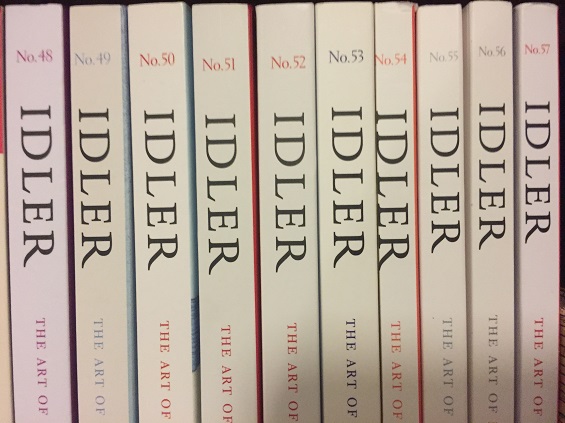
In August, I crossed the river to see some TV producers in Govan about a possible Channel 4 documentary. I quickly got the sense that the doc wasn’t going to happen, but it was fun to travel to the meeting by boat. I might move to an island — that is, an island smaller than Montreal or, indeed, Britain — just to make this happen.

Back to Belfast in September, this time for cultural tourism. Perhaps the highlight for me was the Royal Ulster Academy Annual Exhibition where we saw this ace crab:
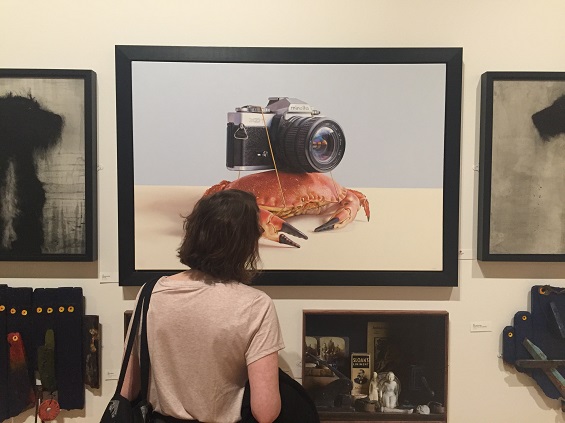
In October, I caught some kid’s helium balloon in my open umbrella. I also teamed up with friends for a Wicker Man ensemble at Halloween.
In November, I got a nice essay into Canadian Notes and Queries, a favourite literary journal. This was a proper bit of writing and I have no idea where I found the time and creative juice to do it. And yet, slightly flirting with Terry Fallis on Twitter was a highlight of my year.
"I didn't win. It went to Terry Fallis, as is traditional." Haha! Issue 100 of @CNandQ containing my piece about the @LeacockMedal came in the post this morning. It is a thing of maximum loveliness. Thank you folks. x @TerryFallis @aaronbushkowsky @CanusHumorous pic.twitter.com/qOUZukHAF2
— Robert Wringham (@rubberwringham) November 14, 2017
In December, Landis and I released a second episode of The Boring Podcast, part of an objects-based collaboration that will, I think, continue next year.
At home, we celebrated Hanukkah in the traditional way — by slightly messing up the mathematically-complicated candle-lighting ceremony. On December 25th we fled the tinselworm and insulated ourselves to Christmas Radiation by walking for an hour to the nearest Odeon to see The Last Jedi.
Throughout the year, our guest room hosted friends from far and wide. There was Emily from New York, Sofia and Drew from British Columbia, Shanti from Montreal, my family from England, Landis from Chicago. When you don’t have the freedom to travel very much, why not bring others to you instead? We also cultivated some new friendships in Glasgow, perhaps especially in Louise, Graeme, and Sven (hi!).
Despite spending a year in the horror of employment, I end 2017 feeling positive and confident. I should be able to pack the day job away in February or March. I suspect I will let you know when that happens, such will be my need to rejoice.
I already know 2018 will be a big year and I’m looking forward to telling you about it as it happens. The escape plan is drafted. The lock picks are primed. Wheels are very much in motion. Bring it on.

*
As is traditional, here is my year in books. It’s a slightly shorter list than usual thanks in part to the aforementioned day job but also in part to a subscription to the eternally-great-but-famously-destructive-to-reading-capacity LRB. Lest we forget, an asterisk* denotes an out-loud read while the dagger† denotes a re-read. Parp!
Patricia Highsmith – The Boy Who Followed Ripley
Robert Sullivan – Rats: A Year with New York’s Most Unwanted Inhabitants
Rutger Bregman – Utopia for Realists
David Nobbs – The Death of Reginald Perrin
Ryan North/Erica Henderson – The Unbeatable Squirrel Girl Vol. 3
Philip Roth – The Ghost Writer
Kakuzo Okakura – The Book of Tea
Simon Barnes – How to be a (bad) birdwatcher
Ann Laird – Hyndland: Edwardian Glasgow Tenement Suburb
Arthur Conan Doyle – The Adventures of Sherlock Holmes*†
Nicholson Baker – How the World Works
Ben Aranovich – The Hanging Tree*
Ernest Hemingway – The Old Man and the Sea
Tom Baker – Who on Earth is Tom Baker?
Nigel Williams – 2 ½ Men in a Boat
Grant Morrison & Darrick Robertson – Happy
J. G. Ballard – Concrete Island
Walter Tevis – The Man Who Fell to Earth
Quentin Bell – Bloomsbury
Quentin Crisp – The Naked Civil Servant
Georges Perec – Species of Spaces and Other Pieces
Patricia Highsmith – Ripley Under Water
Stephen King – Doctor Sleep
Ronnie Scott – Death by Design: The True Story of the Glasgow Necropolis
Janice Galloway – Jellyfish
Roald Dahl – Someone Like You
Penelope Lively – The Purple Swamp Hen and Other Stories
William Golding – The Pyramid
Elaine Dundy – The Dud Avocado*
Amy Licence – Living in Squares, Loving in Triangles
Katherine Mansfield – Bliss and Other Stories
Miranda Sawyer – Out of Time
Dave Simpson – The Fallen
Simon Garfield – The Wrestling
Ben Aaronovitch – The Furthest Station
Piers Anthony – Heaven Cent*
T. E. Lawrence – The Mint
Books read in substantial part but ultimately abandoned (this year, on the unusual grounds of being, simply, shit):
Greg McKeown – Essentialism
Karen Russell – Vampires in the Lemon Grove
Paul Merton – Silent Comedy
Chris Packham – Fingers in the Sparkle Jar
Geoff Dyer – White Sands
As the year closes, I find myself reading Mary Beard’s so-so doorstep SPQR and Richard Sennett‘s soft and bulbous Together.
Being suspicious of sound waves, I never give you a year in music. To make up for this culture dearth, here’s my friend Ian, whose taste is beyond reproach.
An Escapologist’s Diary. Part 50.
Sorry for not blogging in a little while, lovely readers. I’ve been very lazy and — aside from writing the latest New Escapologist essay — have taken almost a month off. I highly recommended it.
We spent a couple of weeks holidaying in Montreal. It was good to be back in my second home and my wife’s first home. What can a young body do in such beautiful surroundings other than lounge on terasses and balconies and on the lush, green mountain? Very little is what.

We were there ostensibly for my brother- and sister-in-law’s wedding, which they had outdoors in the sunshine followed by a great party indoors with lots of good-quality booze. In fact, it was too much good-quality booze in my case, and I had to mysteriously absent myself from the family brunch the next day.
Later in our stay, we popped into the McCord Museum for an exhibition of original magic show posters. I expertly and repeatedly told my companions that this was the very site on which Houdini — the Master Escapologist, about whom I should know everything by now — took the punch to the guttywuts that would kill him a day later. Not only was I certain of it, I was also sure this fact would be the lynchpin of the whole exhibition. In the event, it was mentioned only at the very end of the show that Houdini was in fact walloped at the no-longer-extant Princess Theatre on St. Catherine Street. How could I have been so wrong? I hope my pub quiz team don’t hear of this or I’ll be ritually (and rightly) paddled for this failing in my special subject.
I was, at least, happy to see a pair of handcuffs used by the Master (labelled “Houdini’s handcuffs” as if he had a favourite pair – in fact he usually took regulation cuffs from local police officers) patented exactly a century before my birth. Cool.

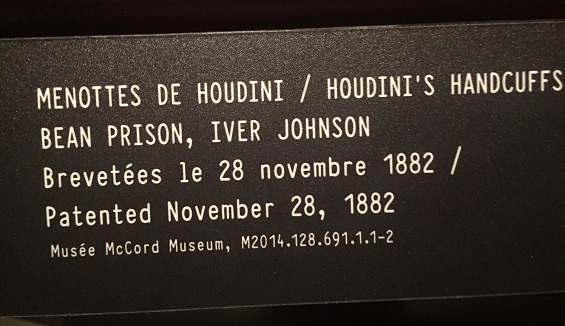
It was very good to be back in this dreamy little island city and I wondered why on earth we ever came back to grey old Scotland. But then I remembered the harsh Montreal winters and how I missed all my friends and how it’s useful to make money every now and then. Bugger.
No sooner were we home in Glasgow did we have to hop on a train to London so I could record one of those online courses for the Idler Academy. It was a nice day of recording in the lovely surroundings of a beagle-filled house on the Thames. As you can see, I worked really hard that day. I’ll let you all know when the course is available (because I’m contractually obliged to).

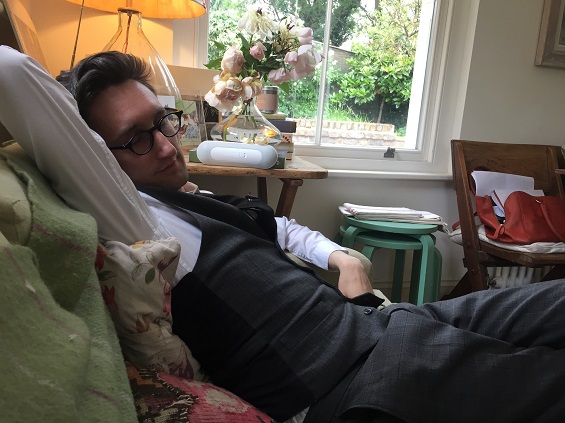
Also in London, we peeked in at the famous Cereal Killer hipster caff on Brick Lane (where, as we sat in the window, a man selling ice cream from a bicycle-and-cart tutted disdainfully at the absurd cereal restaurant before gaily shouting “ice cream!” from his bicycle seemingly oblivious to the irony) and visited the brilliant Queer British Art show at the Tate (where one of the lovelier paintings, it must be said, is on loan from Glasgow’s Kelvingrove Gallery and we can happily see it whenever we like) and took a pointless but long-anticipated legend-tripping pilgrimage to the actual site of the Enfield poltergeist haunting. Oh! And I was stupidly excited to see the Pesticles statue at Hammersmith.
Home now and fairly knackered. Another month off might beckon.
★ If you’d like to re-live the glory days of New Escapologist, please pledge to my Patreon campaign to immediately access 4 new essays (and 4 dusted-off classics) as well as getting a brand new essay at the end of this month. Thanks!
An Escapologist’s Diary. Part 48. Artists’ Colony.
We’ve moved again. Such is the life of an Escapologist. Escape is mobility.
You may remember that we returned to Scotland from Canada and, very fortunately, were able to rent a flat quite cheaply from a friend who, making her own great escape, had left her home for pastures new. “Do you want a tenant?” I asked. For over a year we enjoyed a fine Escapological economy, our rent funding a friend’s escape and her property providing us with a hassle- and paperwork-free landing pad.
Well this was always going to be temporary. We wanted a better-situated HQ and our landlady would make more money renting her flat to real people instead of her slacker pals. So two months ago we moved to Hyndland, a part of Glasgow which, Wikipedia boasts, is home to “young bourgeois bohemians including a number of noted authors, poets, actors and footballers.”
I don’t know if I’d describe a footballer as a bourgeois bohemian (I suspect this is the result of two edits, footballers being tacked on by someone, perhaps a Hyndland estate agent, who doesn’t know what is meant by bourgeois bohemia) but you get the idea.
It’s quite posh in a tumble-down, half-reclaimed-by-nature sort of way and our neighbours all seem to be couples who, despite low incomes, won’t tolerate discomfort and ugliness. Suits us.
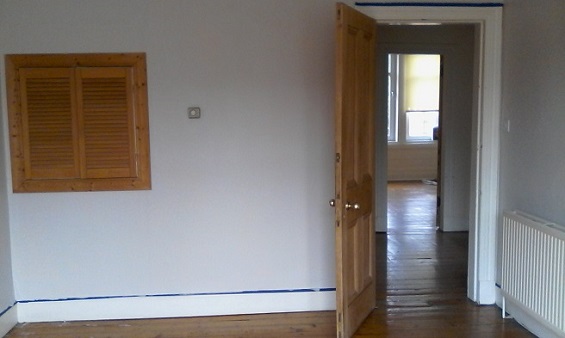

Almost as soon as we moved in, friend Landis came over from Chicago to live in our spare room for a couple of months. It’s been like having a pet artist. He sits at his drafting table all day long, feverishly cross-hatching and coming out, bleary-eyed, for a snack every full moon or so.
It’s been great having Landis over and our home has felt like a little artists’ colony, with he and Samara drawing and me writing at my laptop and something spicy simmering away on the kitchen stove. Not bad. Every now and then we get together and ad-lib a little project like this podcast about notebooks. We look like this:

When we moved in, all we owned was eight boxes of books and clothes, and three small pieces of furniture: even less than in our last move. The flat was unfurnished, so we had to place orders at Ikea and spend some time mooning around in thrift shops. This is all fairly contrary to my nature, so I’ve tried to see it as a creative venture — making something — rather than simply an acquisitive one.
We’ve been guided by minimalism — Is this thing necessary? How few bookshelves can we get away with? Shall we jettison these? — in an act of what in fact is a considerable expansion to our total mass.
This is a good lesson. Even in acquisition (especially in acquisition) be guided by minimalism. Also, “minimal” is relative to your needs. Just don’t kid yourself about your “needs”.
Having Landis over has been helpful in these early weeks, as he’s been able to help build our flatpacks. In fact, the whole move as been a barn-raising exercise with friends coming over to help with bits and bobs. This is nice not just in that it makes the process easier — many hands, light work — but also in that it imbues a corner of the flat with a memory. The bathroom door is now the door Alan sanded down for us. The futon is the futon Neil helped us to build. The sofa was put together by Peter and Sam. etc.
In other news, the Patreon campaign is going fairly well but perhaps not as well as I’d hoped. I think we’ll be okay but I do need more people on board. Dig deep, if you can, and subscribe to the new essay series for as little as £1.
A funny postcard arrives in the mail this morning from Sam’s parents in Canada, depicting scenes of toque-hatted Montrealers trudging through the grey slush and snowmobiles ploughing through the streets. I am so glad to be in Glasgow right now! But bless you, Canada.
★ The post-print phase of New Escapologist is just beginning. Go here to join in.
★ You can also buy all thirteen issues in print or PDF (in newly discounted £20 bargain bundles) at the shop.
An Escapologist’s Diary. Part 47. Extemporale Zone

A weekend break in Berlin to celebrate my birthday and to give Canadian Samara some long-promised time on a larger land mass than the tiny island we now live on.
My third time in Berlin, this was a leisurely trip spent largely sitting around and masticating. She sure doesn’t bring this up often (like every day or anything) but Samara comes from a land of great grub and has moved to a land of decidedly sub-par food just to be with me. Gastronomic tourism is my little way of making amends.
We took an AirBNB in Kreuzberg, my favourite neighbourhood of Berlin, and took refuge from the cold at various bobo-friendly restaurants and bars.
My favourite place to eat wasn’t a resto at all but a marketplace. It was an indoor market hall where you can buy sandwiches for €3 and great coffee for €2 and eat and drink at various little public tables, watching the world go by. Intergenerational groups of locals did the same, enjoying small glasses of wine in the leisurely fashion not quite embraced by the Calvinists of Scotland and England. This being a market hall, I was also able to enjoy the presence of gigantic German sausages. I didn’t know where to look.

On Saturday we visited the museum at Bauhaus archive. We love Bauhaus (who doesn’t?) and it fits in nicely with our current line of thinking about artistic production (social, art-meets-utility, minimalist).
Leaving the building, we spotted this stone tablet (above) declaring an “Extemporale Zone” (or “out-of-time zone”) in which “the representation of eternity in every instant is the uniting sound before utopia”.

On Sunday I had to meet a journalist from Die Welt to be profiled for the newspaper with regards to my book, Ich Bin Raus. I think the journalist was largely on board, though we had limited time together so I probably just yelped something about escapology and hoped for the best.
As with other journalists I’ve met lately she asked about automation and the coming crisis in the nature of work, which is clearly a big topic at the moment and one I could talk about for a long time. Ultimately, I think we have to choose as a society between something approaching socialism (UBI) and the ultimate expression of neoliberalism (widespread precariat struggle) and I think I was able to communicate this in the time we had.
Monday morning and we touch down in Glasgow, ever-so-slightly larger. Burp.
★ The post-print phase of New Escapologist is just beginning. Go here to join in.
★ You can also buy all thirteen issues in print or PDF (in newly discounted £20 bargain bundles) at the shop.



